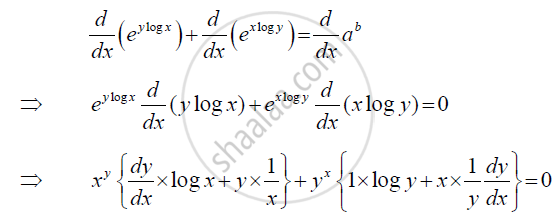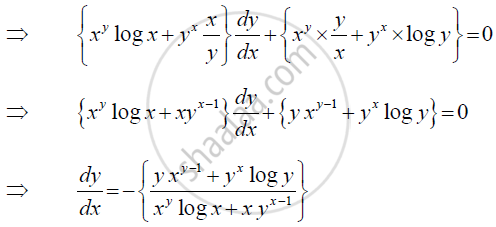Advertisements
Advertisements
Question
if `x^y + y^x = a^b`then Find `dy/dx`
Solution
Given that,
`x^y + y^x = a^b`
=> `e^(ylogx) + e^(xlogy) = a^b`
On differentiating both sides with respect to x, we get


APPEARS IN
RELATED QUESTIONS
Let \[f\left( x \right)\begin{cases}a x^2 + 1, & x > 1 \\ x + 1/2, & x \leq 1\end{cases}\] . Then, f (x) is derivable at x = 1, if
Find `(dy)/(dx) , "If" x^3 + y^2 + xy = 10`
Discuss extreme values of the function f(x) = x.logx
If `sin^-1((x^5 - y^5)/(x^5 + y^5)) = pi/(6), "show that" "dy"/"dx" = x^4/(3y^4)`
Find `"dy"/"dx"`, if : x = sinθ, y = tanθ
Find `"dy"/"dx"`, if : `x = cos^-1((2t)/(1 + t^2)), y = sec^-1(sqrt(1 + t^2))`
Differentiate xx w.r.t. xsix.
If x = at2 and y = 2at, then show that `xy(d^2y)/(dx^2) + a` = 0.
If y = x + tan x, show that `cos^2x.(d^2y)/(dx^2) - 2y + 2x` = 0.
Find the nth derivative of the following : y = eax . cos (bx + c)
Choose the correct option from the given alternatives :
If y = sin (2sin–1 x), then dx = ........
Choose the correct option from the given alternatives :
If y = `a cos (logx) and "A"(d^2y)/(dx^2) + "B""dy"/"dx" + "C"` = 0, then the values of A, B, C are
Differentiate the following w.r.t. x : `tan^-1((sqrt(x)(3 - x))/(1 - 3x))`
Differentiate the following w.r.t. x : `cos^-1((sqrt(1 + x) - sqrt(1 - x))/2)`
DIfferentiate `tan^-1((sqrt(1 + x^2) - 1)/x) w.r.t. tan^-1(sqrt((2xsqrt(1 - x^2))/(1 - 2x^2)))`.
Differentiate `tan^-1((sqrt(1 + x^2) - 1)/x)` w.r.t. `cos^-1(sqrt((1 + sqrt(1 + x^2))/(2sqrt(1 + x^2))))`
Find `"dy"/"dx"` if, xy = log (xy)
Solve the following:
If `"x"^5 * "y"^7 = ("x + y")^12` then show that, `"dy"/"dx" = "y"/"x"`
State whether the following is True or False:
The derivative of `"x"^"m"*"y"^"n" = ("x + y")^("m + n")` is `"x"/"y"`
If `"x"^"a"*"y"^"b" = ("x + y")^("a + b")`, then show that `"dy"/"dx" = "y"/"x"`
Find `(dy)/(dx)`, if `y = sin^-1 ((2x)/(1 + x^2))`
If y = `sqrt(tan x + sqrt(tanx + sqrt(tanx + .... + ∞)`, then show that `dy/dx = (sec^2x)/(2y - 1)`.
Find `dy/dx` at x = 0.
`"If" log(x+y) = log(xy)+a "then show that", dy/dx=(-y^2)/x^2`
If log(x + y) = log(xy) + a then show that, `dy/dx = (-y^2)/x^2`
Find `dy/dx` if, `x = e^(3t), y = e^(sqrtt)`
If log(x + y) = log(xy) + a then show that, `dy/dx = (-y^2)/x^2`
Find `dy/dx"if", x= e^(3t), y=e^sqrtt`
